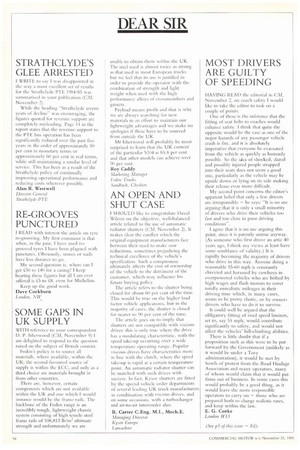MOST DRIVERS ARE GUILTY OF SPEEDING
Page 96

If you've noticed an error in this article please click here to report it so we can fix it.
HAVING READ the editorial in CM, November 2, on coach safety I would like to take the editor to task on a couple of points.
One of these is the inference that the fitting of seat belts to coaches would enhance safety. I think that quite the opposite would be the case as one of the major hazards of any passenger vehicle crash is fire, and it is absolutely imperative that everyone he evacuated from the vehicle as quickly as humanly possible. So the idea of shocked, dazed and possibly injured people strapped into their seats does not seem a good one, particularly as the vehicle may be upside down or lying on its side making their release even more difficult.
My second point concerns the editor's apparent belief that only a few drivers arc irresponsible — he says: "It is no use arguing that it is only a small minority of drivers who drive their vehicles too fast and too close in poor driving conditions-.
I agree that it is no use arguing this point, since it is patently untrue anyway. (As someone who first drove an artic 40 years ago, I think my views at least have some semblance of validity.) It is rapidly becoming the majority of drivers who drive in this way. Anyone doing a reasonable 55-60 mph is constantly chivvied and harassed by cowboys in overpowered vehicles who are bribed by high wages and flash motors to cover totally unrealistic mileages in their driving time which, in many cases, seems to be pretty elastic, or by ownerdrivers who have to do it to survive.
It could well be argued that the obligatory fitting of road speed limiters, set to, say 55 mph, would contribute significantly to safety, and would not affect the vehicles' hill-climbing abilities.
There is little doubt that if a proposition such as this were to be put forward by the Government (unlikely as it would be under a Tory administration), it would be met by howls of protest front the Road Haulage Association and many operators, many of whom would claim that it would put Arms out of business. In some cases this would probably be a good thing, as it would leave the more responsible operators to carry on — those who are prepared both to charge realistic rates, and keep within the law.
E. G. Corke London W13












































































































































